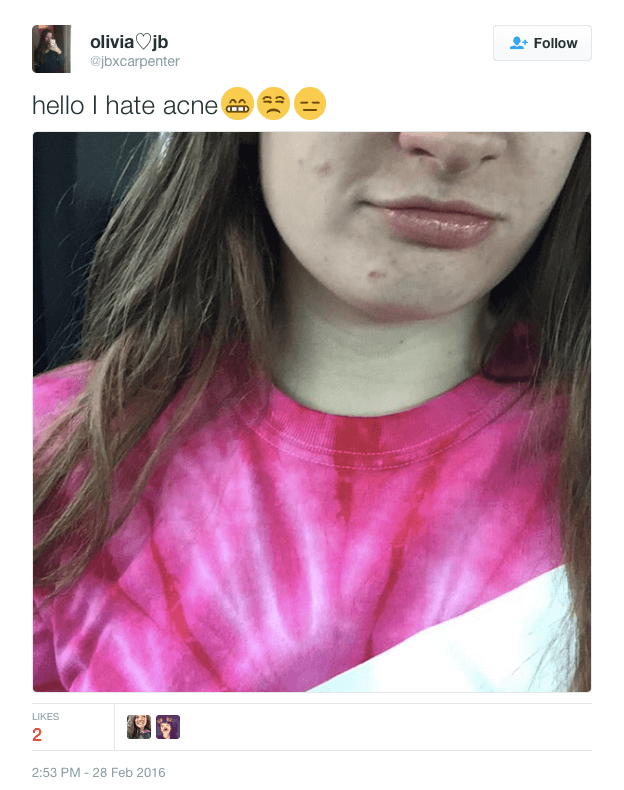I hate acne so much, I wish there was an app for that 
1. Picking your acne
Even though most of us know not to pick our acne, it can be difficult to avoid. Almost subconsciously, our hands find our ways to the worst acne bumps and we squeeze and scratch them. Unfortunately, manipulating acne can make it last much longer and can raise the risk of leaving behind a dark mark, or worse, a scar. Squeezing the acne bumps can injure the surrounding skin and spread infection. Scratching acne can lead to a sore which can take weeks to heal, rather than the few days required for most acne bumps to resolve. Dark spots from manipulation last months and scarring can be permanent. Do whatever you can to avoid picking and squeezing your acne. One strategy is to put a bandage over the worst spots.
hello I hate acne???
— olivia♡jb (@jbxcarpenter) February 28, 2016
Ask a dermatologist about your acne today!
2. Using home remedies
The truth is, if “home remedies” worked they would be backed up by evidence and prescribed by doctors. Not only do most of these elixirs not work, many can be harmful. Tea tree oil, for example, is a popular “natural cure-all” that in reality can make many skin conditions worse by causing irritation, inflammation, and even allergy. I have personally seen patients try to treat their acne with rubbing alcohol and lime juice. These will make the acne last longer and can cause long term damage to the skin. Just because a product is natural does not mean it is safe (arsenic and lead are also natural, for example). Trust your dermatologist and avoid home remedies. Read about the “Top Five Acne Misconceptions” here.
3. Drying your face out with soap
Soap helps prevent acne. Once an acne lesion has developed, soap isn’t going to do much to make it go away. Many of us make the mistake of nuking our face with soap during a breakout. This causes a lot of drying of the skin which can impair the healing process that leads to the resolution of the acne.
Ask a dermatologist about your acne today!
4. Quitting your acne regimen
Don’t give up. Most acne regimens from dermatologists take 8-10 weeks before definitive improvement is seen. If 10 weeks pass without improvement, that means your dermatologist may need to get more aggressive. Virtually everyone with acne who has access to a dermatologist should be able to achieve clear skin. The challenge is finding the right treatment and being consistent. For mild acne, topical treatments alone are often effective. These include over the counter benzoyl peroxide and prescription topical retinoids. Moderate acne is usually treated with oral antibiotics like doxycycline or minocycline. Severe acne has a few different approaches, including Accutane with or without oral steroids. There are other adjunctive treatments that your dermatologist can consider including topical antibiotics, birth control pills, and spironolactone. A First Derm dermatologist can get you started on over the counter topical medications while an in-person consultation would be necessary if you require further treatment.
5. Putting your life on hold
Your skin is one of the first things that people notice when they see you. It makes an impression on how others feel about us. There are unfair characterizations that people with acne have poor hygiene. The reality is that people with acne often have hygiene as good as or better than those without acne. However, society places a high value on clear, radiant skin. Follow your dermatologist’s advice on treating your acne, and in the meantime use non-comedogenic cover up to hide lesions that haven’t yet gone away. Your life and happiness should always be prioritized above your acne.
Ask a dermatologist about your acne today!
By Dennis A Porto, MD DennisAPorto.com

The Specialist doctor from the University Hospital in Gothenburg, alumnus UC Berkeley. My doctoral dissertation is about Digital Health and I have published 5 scientific articles in teledermatology and artificial intelligence and others.


